Case studies
Listen to the following people talking about their experiences of caring, their roles and responsibilities and how they feel about their current situation.
If you want to read a speaker’s words as you listen, click on the ‘Transcript’ link beneath the player.
Box _unit2.1.1 Alana
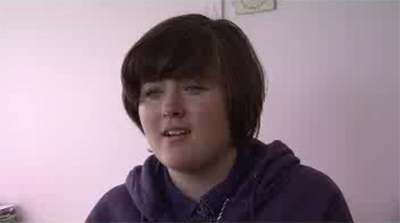
Transcript
Alana is 17 years old and cares for her mum and sister. She helps with practical tasks and supports her mum and sister in understanding situations. Alana started caring when her dad left, helping her mum cope and taking care of her sister including attempting to resolve issues on behalf of her sister in school.
Alana goes out once a month with a young adult carer group and receives one-on-one support. She is studying Hairdressing in college, has just passed her Level 1 and will be progressing onto Level 2.
She does find it difficult studying while caring, she mentions her A2A card and EMA as things that help (see box below for more information).
Box _unit2.1.2
A2A stands for Access to Action Card. Some Local Authorities in Wales issue these to young carers. It helps young people to tell teachers/tutors that they are carers.
EMA stands for Education Maintenance Allowance. It is a weekly payment for young people from low household incomes, to help cover the costs of them staying in education.
Box _unit2.1.3 James
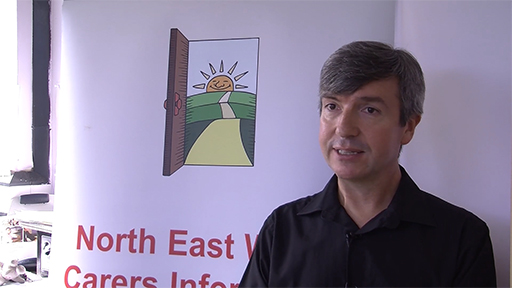
Transcript
James is 45 years old and cares for his mum who has Alzheimer’s disease. James’ mum has recently gone into residential care as the disease had reached a point where she needed to be in a safer environment.
Caring changed James’ life significantly. He had a busy, successful career but as his mum’s illness progressed, she moved closer to him and he found he needed more and more time to provide care for her. To be able to do this, James took voluntary redundancy and found part-time employment with a local carers’ service.
Having left full-time employment, he was able to begin an MSc in Psychology one day a week. James finds -studying calming and comforting, and an important distraction.
Box _unit2.1.4 Suzanne
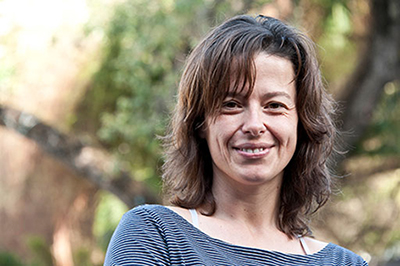
Transcript
Suzanne helps care for her brother who has schizophrenia. Suzanne feels her caring role isn’t just about caring for her brother but also about supporting other members of her family including her dad.
When she first started caring for her brother, Suzanne found it difficult and felt quite alone coming to terms with changes to her brother’s personality.
Suzanne feels that as a carer she has developed a greater awareness of her own instincts and feelings, as well as developing independent research skills. She also feels that caring helped her to question and challenge people in positions of expertise or authority. Five years on from her brother’s diagnosis, Suzanne has found that in many ways it has had a positive impact and that her family has been brought closer together.
The support from the local carers’ service was important to Suzanne, including the provision of counselling and training.
Suzanne is a writer and a community worker who sees herself in the future spending more time writing and having more work published.
Box _unit2.1.5 Christine
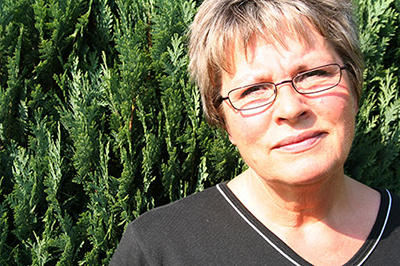
Transcript
Christine cares for her son who is 19 and has multiple and complex disabilities.
Christine considers herself a naturally caring person; she’s a qualified nursery nurse, and enjoys looking after children. She finds it hard to call herself her son’s carer because she is his mum.
The lowest point of caring for Christine is the loneliness and isolation, not just for herself but also for her son. Christine is frustrated with the lack of provision for her son locally.
Christine feels she has learned a great deal from caring for her son; about herself and everyone else in the world. The skills Christine identifies include empathy, determination, selflessness and the ability to be assertive particularly in support of her son.
Christine and her son are going through a period of transition as her son will be going to residential college soon. Christine knows this period is going to be difficult but remains positive and hopeful she can work through it with the support of her husband.
Box _unit2.1.6 Claire
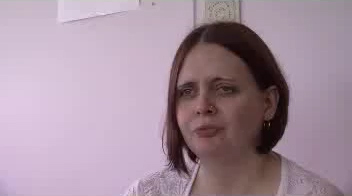
Transcript
Claire is 32 years old and cares for her partner who has Becker Muscular Dystrophy. She was also long-term carer for her mother who died in 2012. Her mother wasn’t diagnosed but held many Asperger’s/Autistic traits.
Claire feels being a carer has made her more understanding and improved her problem-solving skills and adaptability. Caring for her mother was an emotionally draining experience whereas caring for her partner is more physical.
School was not a good experience for Claire because of bullying and her home environment. After leaving school, she completed childcare courses but then struggled with her own mental health problems.
Claire has been learning sign language. She found it difficult to get to the point where she felt confident enough to go into a learning environment, but is now studying Institute of British Sign Language Level 1 and hopes to go onto Level 2.
Claire intends to do some voluntary work with deaf people so she can practise sign language and learn more. She feels she has learned most from the people she meets who have had struggles.
These examples show many of the challenges that carers experience but also the opportunities that carers have to develop their skills and pursue opportunities that matter to them – such as James’ MSc in Psychology and Alana’s hairdressing training course. Perhaps some aspects of the above stories reflect your own experiences?
Reflection isn’t always easy – and thinking about your experiences of caring can be painful and difficult to think through, for any number of reasons. At the same time, it’s not always easy to understand what you have learned from past experiences or decisions taken.
It’s therefore sometimes quite helpful if you can work through these reflections with additional support if this is available to you –a friend or mentor or a support worker from a local carers’ service, for instance. If at any point you feel the course has brought difficult emotions, then you can visit Carers.org [Tip: hold Ctrl and click a link to open it in a new tab. (Hide tip)] to find out where your nearest local support service is or to talk to someone online. There are also useful contacts in the Find out more section of this course.
